|
|
|
Sort Order |
|
|
|
Items / Page
|
|
|
|
|
|
|
| Srl | Item |
| 1 |
ID:
192279
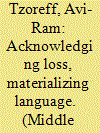

|
|
|
|
|
| Summary/Abstract |
This article focuses on Rabbi Yosef Hayyim's discussions of translation and hermeneutics, as a reflection of the broad movements between languages throughout the Ottoman Empire and the Indian Ocean, and the linguistic inequalities that characterized them. Reading Hayyim against his Baghdadi context, considering the printing and translational activities of the British missionaries of the London Society for Promoting Christianity amongst the Jews and the hermeneutics that were developed in the Baghdadi Salafiyya, I argue that Hayyim's opposition to the translation of Jewish Kabbalistic knowledge should not be seen as a conservative approach that prevents its popularization, but as an understanding of the linguistic power relations involved within the act of translation. Juxtaposed vis-à-vis his uses of Arabic translations in other responsas and his call for the teaching of standard Arabic in Jewish schools in Baghdad, that cohered with the Nahdawi perception of Arabic as a major aspect of the Ottoman Mashriq Arab political community, I argue that these incidents reflect different intersections of languages and power that occurred in the urban sphere of Ottoman Baghdad.
|
|
|
|
|
|
|
|
|
|
|
|
|
|
|
|
| 2 |
ID:
028774
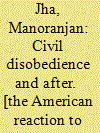

|
|
|
|
|
| Publication |
Meerut, Meenakshi Prakashan, 1973.
|
| Description |
xi, 300p.: bib.hbk
|
|
|
|
|
|
|
|
|
|
|
|
Copies: C:1/I:0,R:0,Q:0
Circulation
| Accession# | Call# | Current Location | Status | Policy | Location |
| 012185 | 954.03/JHA 012185 | Main | On Shelf | General | |
|
|
|
|
| 3 |
ID:
178425
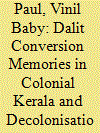

|
|
|
|
|
| Summary/Abstract |
This article seeks to decolonise knowledge of the conventional history of Dalits’ Christian conversion and its implications in colonial Kerala. As the missionary archive is the only source of Dalit Christian history writing in Kerala, in this historiography social historians have been unable to include the memories of Protestant missionary work at the local level by the local people themselves. Their experiences and rich accounts are marked by dramatic actions to gain socio-economic freedom and to establish a safe environment with the scope for future development. This article identifies how Dalit Christians themselves, in a specific locality, remember their conversion history, suggesting thereby the scope for a valuable addition to the archive.
|
|
|
|
|
|
|
|
|
|
|
|
|
|
|
|
| 4 |
ID:
187122
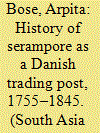

|
|
|
|
|
| Summary/Abstract |
Serampore, a small town of West Bengal, today virtually a suburb of Kolkata, has an unusual history and heritage as a Danish trading post/colony between 1755 and 1845. Creating a bustling, well-organised town, the Danes introduced various reforms which prepared the nineteenth-century awakening in Bengal. While the history of this Danish involvement at Serampore awaits fuller archival research, this article feeds on a range of local sources and contemporary travel accounts to discuss details of the Danish engagement in Serampore. The article also illustrates how, beyond the dominant British influence, colonial India experienced other foreign interventions that remain pertinent today, not just regarding trade but also missionary activities and some local sub-structures that have become almost invisible.
|
|
|
|
|
|
|
|
|
|
|
|
|
|
|
|
| 5 |
ID:
174417
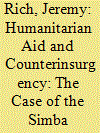

|
|
|
|
|
| Summary/Abstract |
This article demonstrates how the U.S. and Congolese governments successfully used humanitarian aid in their counterinsurgency campaign against the rebel Conseil National de la Libération (CNL) in the Democratic Republic of Congo from 1964 to 1967. Washington orchestrated an effective military counteroffensive through the use of mercenaries and extensive logistical support. Though relief organizations claimed to be apolitical, they allowed Congolese and mercenary forces to use access to food and medical aid to entice rebels to surrender and to turn popular support away from the insurgents. The fighting created a major crisis, as famine took hold in rebel-held areas cut off from supplies. Although government abuses of civilians appalled Red Cross and Protestant aid personnel, they kept quiet about the army’s indiscriminate use of violence. One major reason for this willingness to partner with the Kinshasa government was the CNL, which treated humanitarian organizations as if they were mere tools of U.S. imperialism. Ultimately, the rebels bungled negotiations with the Red Cross over the fate of foreigners they held hostage in Stanleyville in 1964. These errors pushed humanitarian organizations further toward siding with the Congolese military. Moreover, Congolese military officers allowed humanitarian organizations to operate in only government-controlled territory.
|
|
|
|
|
|
|
|
|
|
|
|
|
|
|
|
| 6 |
ID:
143332
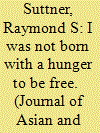

|
|
|
|
|
| Summary/Abstract |
There is a stark contrast between Nelson Mandela the freedom fighter and the young man who grew up in rural Transkei without a ‘hunger to be free’. Until entering Johannesburg in 1941, he generally did not recognise or resist white oppression. Mandela was destined to be counsellor to the future abaThembu king, not a leader himself. Nevertheless, he encountered discordant notes, suggesting that he could not be a man as long as Africans were a conquered people. His consequent transition to manhood remained unresolved until his involvement in the defiance of the apartheid regime, which signified the attainment of his manhood that had been denied to him in earlier life.
|
|
|
|
|
|
|
|
|
|
|
|
|
|
|
|
| 7 |
ID:
101293


|
|
|
|
|
| Publication |
2010.
|
| Summary/Abstract |
This article discusses experiences of cultural globalization among young Muslims in Osh, Kyrgyzstan, and male students in particular. Drawing on studies of globalization and youth culture, the article suggests that the everyday lives of boys and young men can be understood as negotiations in a 'marketplace for styles and identities'. The students engage with an unprecedented range of cultural repertoires, from 'true Islam' and Christian messages to global capitalism and Russian rap music. Based on extensive ethnographic research, the article discusses young people's interactions with transnational actors and media images, and their appropriation of a number of 'spaces' made available by globalization. In commercial outlets such as Internet cafeacutes, in religious circles and sports clubs, male students experiment with styles and identities, often without experiencing contradictions. However, their choices are not random. Their reception and utilization of 'global' cultural goods and ideas are constrained by their socio-economic, linguistic, ethnic, religious and gender backgrounds and by various rules at the local, regional and national levels.
|
|
|
|
|
|
|
|
|
|
|
|
|
|
|
|
| 8 |
ID:
161639
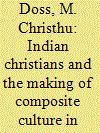

|
|
|
|
|
| Summary/Abstract |
While North India erupted in rebellion in 1857, South India was experiencing a range of cross-cultural contests between missionary Christianity and local converts, who protested against Indian culture being dismissed as a work of the devil. Converts in the emerging Christian communities, particularly in South India, made efforts to retain their indigenous cultural ethos as part of their lived experience. Early attempts to balance Indian identity with Christian beliefs and practices were later replicated in a second anti-hegemonic movement by claims of Indian Christians for respectful inclusion into the new composite nation of postcolonial India.
|
|
|
|
|
|
|
|
|
|
|
|
|
|
|
|
| 9 |
ID:
115291
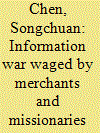

|
|
|
|
|
| Publication |
2012.
|
| Summary/Abstract |
This paper explores the efforts and impact of the Society for the Diffusion of Useful Knowledge in China (1834-1839), which existed during the five years before the First Opium War. It contends that the Society represented a third form of British engagement with the Chinese, alongside the diplomatic attempts of 1793 and 1816, and the military conflict of 1839-1842. The Society waged an 'information war' to penetrate the information barrier that the Qing had established to contain European trade and missions. The foreigners in Canton believed they were barred from further access to China because the Chinese had no information on the true character of the Europeans. Thus, they prepared 'intellectual artillery' in the form of Chinese language publications, especially on world geography, to distribute among the Chinese, in the hope that this effort would familiarize the Chinese with the science and art of Westerners and thereby cultivate respect and a welcoming atmosphere. The war metaphor was conceived, and the information war was waged, in the periphery of the British informal empire in Canton, but it contributed to the conceptualization of war against China, both in Canton and in Britain, in the years before actual military action. Behind the rhetoric of war and knowledge diffusion in Canton, lay a convergence of interests between merchants and missionaries, which drove both to employ information and military power to further their shared aim of opening China up for trade and proselytizing.
|
|
|
|
|
|
|
|
|
|
|
|
|
|
|
|
| 10 |
ID:
142831
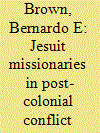

|
|
|
|
|
| Summary/Abstract |
In August 1990, Father Eugene John Hebert SJ disappeared while trying to reach his home in the Sri Lankan city of Batticaloa. Caught in the midst of the turmoil that confronted Tamil and Muslim minorities after the peace-keeping operations led by the Indian armed forces collapsed, Father Hebert was one of thousands of victims who perished in the violence that engulfed the Eastern Province of Sri Lanka between June and September 1990. Since the early stages of the ethnic conflict (1983–2009), American Jesuits stationed in Tamil-speaking areas of the island had become de facto human rights activists, being virtually the only remaining trusted mediators between the different factions involved in the armed confrontation. Their efforts to foster peace and dialogue in the region were far from their original assignment as educators—which Father Hebert had been conducting since his arrival in 1948. This article not only traces Father Hebert's life trajectory from Louisiana to Sri Lanka, it also reflects on the cultural impact that the presence of American Jesuits had in the entire region, as well as on the changing responsibilities they assumed in the volatile political context of the island that took them from coaching basketball to becoming catalysts for peace.
|
|
|
|
|
|
|
|
|
|
|
|
|
|
|
|
| 11 |
ID:
172209
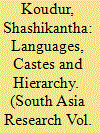

|
|
|
|
|
| Summary/Abstract |
In the former South Kanara or south coastal Karnataka region, the presence of overlapping languages, mainly Tulu and Kannada, posed prolonged dilemmas in the nineteenth century for the Basel Mission. The choice of language was important for their evangelical work, supported by important language-related activities such as dictionary making, grammar writing and translations. Since language use was intertwined with caste hierarchy, this raised issues over the position of lower castes, mainly Billavas, for the native elites and upper castes. This article argues that the prioritisation of Kannada, and relegation of Tulu to a secondary position, was an outcome not only of missionary perceptions of the larger Kannada context, but also more importantly can be traced back to elite representations regarding the subaltern Tulu culture and lifeworld. As missionary intervention in education and native language use challenged the status quo of social hierarchy among local communities, this sparked efforts by the native elites to reclaim and restore the earlier hierarchy. In the process, the native elite representations of Tulu language and culture became at the same time an effort at dismissal and appropriation.
|
|
|
|
|
|
|
|
|
|
|
|
|
|
|
|
| 12 |
ID:
147564
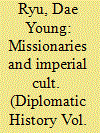

|
|
|
|
|
| Summary/Abstract |
State Shinto was established in colonial Korea to assimilate the Korean population. Although the Japanese government declared the Shinto ceremonies as non-religious, patriotic rituals, they consisted of traditional Shinto rites. When the Japanese authorities began forcing attendance at Shinto shrine rites, two American Presbyterian missions in Korea refused to cooperate. Their uncompromising attitude enraged the Japanese authorities, and embarrassed the American diplomatic establishment and accommodative members of the missionary community. As the Shinto shrine issue developed into a public controversy, American diplomats had to protect the national priorities over and against the private interests of missionaries.
|
|
|
|
|
|
|
|
|
|
|
|
|
|
|
|
| 13 |
ID:
148841
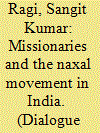

|
|
|
|
|
| Summary/Abstract |
Questions are often asked if there is an understanding between the Maoists and missionaries and the NGOs which have been working in the remote tribal areas for the sick, illiterate and poor. Do they actually lend a helping hand to the Maoists and their cause? Does the Western world which is so hostile towards the Islamic extremism and highly critical of communism, ignore the left extremism and provide strength by funding the same through the Non-governmental organizations working in the remote forest areas? And do they do so consciously because Maoists have been generous to the Christian missionaries, whose welfare and charitable activities, as well as the evangelical programmes, are primarily located in the tribal belts? These are the questions and many more which have been subjects of debate for long in India. While the right wing organizations have been accusing the missionaries and Maoists of having both covert and overt linkages, depending on the situation. The Christian organizations reject such premises and attribute them to a conscious campaign designed to denigrate their charitable work.
|
|
|
|
|
|
|
|
|
|
|
|
|
|
|
|
| 14 |
ID:
052460
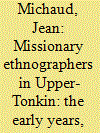

|
|
|
|
|
| Publication |
June 2004.
|
| Summary/Abstract |
Little is known of the contributions of French missionaries to early highland ethnography in the mountainous north of Vietnam (then Tonkin) at the time of colonial contact, a period defined here as 1895-1920. This paper investigates how a handful of men from the Catholic Société des Missions étrangères de Paris contributed significant amounts of text from their postings in remote parts of the Upper-Tonkin (Haut-Tonkin) vicariate, and in some cases Southwest China. A selection of their prose is presented and its ethnographic value appraised, bringing to light the authors in their context as well as the texts themselves. It is assessed in conclusion that, despite their uneven importance as a source for ethnography, these texts nevertheless constitute a unique supply of information on the populations they describe.
|
|
|
|
|
|
|
|
|
|
|
|
|
|
|
|
| 15 |
ID:
145464
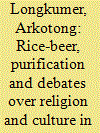

|
|
|
|
|
| Summary/Abstract |
The aim of this paper is to examine the importance of rice-beer (zao) amongst the Zeme Nagas of Assam. Colonial officials and Christian missionaries brought new ideas into Zeme social and cultural practices, quite different from their own. One way to frame this interaction is to examine the tension between world-views held by indigenous religions and Christianity, and what this tension represents for the Zeme. I aim to demonstrate how the terms ‘religion’ and ‘culture’ can be understood by examining the position of rice-beer in Zeme society. I will show how these debates were influenced by nineteenth-century Victorian interlocutors, and equally how local discourses have appropriated these colonial concepts as a point of leverage for internal social dynamics in contemporary times.
|
|
|
|
|
|
|
|
|
|
|
|
|
|
|
|
| 16 |
ID:
161409
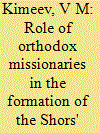

|
|
|
| 17 |
ID:
141773
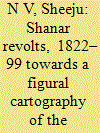

|
|
|
|
|
| Summary/Abstract |
This article focuses on the Shanar revolts, a series of subaltern uprisings in nineteenth-century South Travancore, for the right to wear upper clothes over the bosoms of Shanar women. In the parlance of official accounts and modern histories, these revolts are mere disturbances or controversies and the subaltern rebels in these struggles were always pretenders. Contrary to this, an attempt is made here to document and explicate the becoming of the pretender and to demonstrate that historiography may well be implicated, all too easily, in generating the very precarity of the pretender by opposing any movement towards reform.
|
|
|
|
|
|
|
|
|
|
|
|
|
|
|
|
| 18 |
ID:
170829
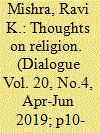

|
|
|
| 19 |
ID:
152493
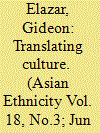

|
|
|
|
|
| Summary/Abstract |
In an attempt to emulate early modern missionaries to Yunnan who engaged in the invention of writing systems for various ethnic groups, contemporary evangelical missionaries in Yunnan have become heavily involved in the realm of linguistics, focused on the preservation of endangered languages. While such activity may potentially be perceived as a challenge to the state-Chinese linguistic hegemony, I argue that the presence of missionary linguists is acceptable to the Chinese authorities as it does not threaten the paramount position of Putonghua but rather serves to integrate minority people into the state system. In addition, based on interviews conducted with a missionary working to produce texts for Kunming’s Buoyi population in their language, I aim to demonstrate how missionary linguists attempt to remold local culture by attempting to reconstruct ethnic identity around a language core. The article is based on fieldwork conducted in Yunnan in 2009–2010 and 2012.
|
|
|
|
|
|
|
|
|
|
|
|
|
|
|
|
| 20 |
ID:
027730
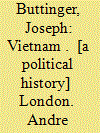

|
|
|
|
|
| Publication |
London, Andre Deutsch, 1969.
|
| Description |
viii, 565p.hbk
|
| Standard Number |
233961070
|
|
|
|
|
|
|
|
|
|
|
|
Copies: C:1/I:0,R:0,Q:0
Circulation
| Accession# | Call# | Current Location | Status | Policy | Location |
| 001926 | 959.7/BUT 001926 | Main | On Shelf | General | |
|
|
|
|
|
|
|
|
|